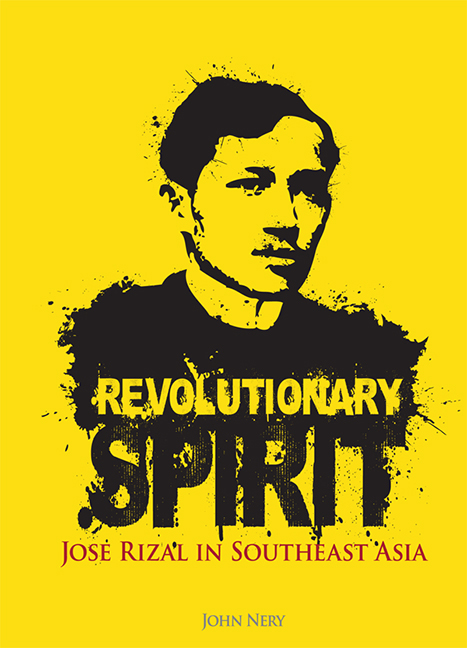Book contents
- Frontmatter
- Dedication
- Epigraph
- Contents
- Foreword
- Message
- Preface
- Acknowledgements
- INTRODUCTION The Uses of Error A Rizal Chronology
- 1 TURNING POINTS
- 2 “THE VERY SOUL OF THIS REBELLION”
- 3 DOCTOR RIZAL
- 4 “HALFBLOED”
- 5 “NO MARX OR LENIN”
- 6 UNDER THE SOUTHERN SUN
- 7 THE HOPE OF MILLIONS IN ASIA
- 8 “HIS NAME IS SWEET IN OUR MEMORY”
- 9 THE MYTH BUSTERS
- 10 “A GREAT HISTORICAL EXPERIMENT”
- Epilogue
- Appendices
- References
- Index
7 - THE HOPE OF MILLIONS IN ASIA
Published online by Cambridge University Press: 21 October 2015
- Frontmatter
- Dedication
- Epigraph
- Contents
- Foreword
- Message
- Preface
- Acknowledgements
- INTRODUCTION The Uses of Error A Rizal Chronology
- 1 TURNING POINTS
- 2 “THE VERY SOUL OF THIS REBELLION”
- 3 DOCTOR RIZAL
- 4 “HALFBLOED”
- 5 “NO MARX OR LENIN”
- 6 UNDER THE SOUTHERN SUN
- 7 THE HOPE OF MILLIONS IN ASIA
- 8 “HIS NAME IS SWEET IN OUR MEMORY”
- 9 THE MYTH BUSTERS
- 10 “A GREAT HISTORICAL EXPERIMENT”
- Epilogue
- Appendices
- References
- Index
Summary
On 17 January 1946, the first issue of Bakti, a small magazine published in Mojokerto, some 40 miles southwest of Surabaya, saw the light of day. In its devotion to the idea of independence, its earnest polemics and exhortatory rhetoric, it was characteristic of the many publications (Rosihan 1997) that flourished during the Indonesian revolution.
Bakti styled itself “Soeara Rakjat ditengah api perdjoangan — The Voice of the People Amid the Fire of Struggle.” The stirring slogan would appear under the magazine's banner in almost all of its issues. The name of the magazine itself could perhaps be best translated as “Loyalty,” and the cover page of the first issue emphasized the point, with a message headlined “Kebaktian warga Negara — Loyal Citizens.”
It was a revolutionary publication, in that it identified completely with the aims of the revolutionary Republican government then precariously in power. The message on the cover, effectively the magazine's editorial, defined a citizen's loyalty in terms of purity of intention, with a recent quotation from Soerjo, the newly named governor of East Java, setting those terms. “Each of the obligations imposed by the State on all should be done with purity of heart. Each person should feel that he is always witnessed by God in doing his job.” The editorial concludes:
Only in this way will the public interest be guaranteed and we will also avoid the false path, those roads marked “public interest” only in name but are in fact “self interest.”
For the young journalists behind Bakti, part of the true path led through Jose Rizal and the Philippines’ own struggle for independence.
The traditional emphasis on “purity of heart” was followed by a quotation on the second page about modernity. Headlined “Public Opinion” (in English and in inverted commas), the set of excerpts from a directive of the Ministry of Information called for “modern tools” to generate more books, magazines, and newspapers. “This is the most important tool to generate public opinion in modern society.”
It was this need, the creation of public space where ideas and opinions can be shared, that Bakti sought to fill. A lengthy foreword on Page 3 (that is to say, the first page of the magazine, the covers excluded) rooted the publication in the independence struggle.
- Type
- Chapter
- Information
- Revolutionary SpiritJose Rizal in Southeast Asia, pp. 161 - 171Publisher: ISEAS–Yusof Ishak InstitutePrint publication year: 2011



